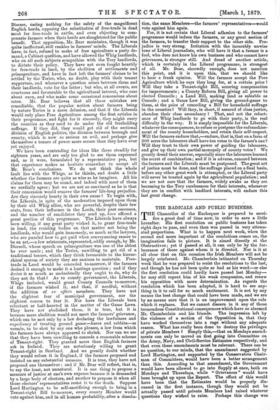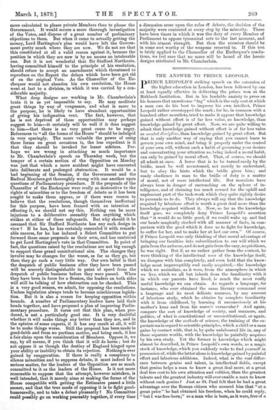THE RADICALS AND PUBLIC BUSINESS.
THE Chancellor of the Exchequer is prepared to sacri- fice a great deal of time now, in order to save a little hereafter. His first resolution on public business has taken eight days to pass, and even then was passed in very attenu- ated proportions. What is to happen next week, when the second and more important of the resolutions comes on, the imagination fails to picture. It is aimed directly at the Obstructives ; yet if passed at all, it can only be by the for- bearance of those against whom it is directed. Nor is it at all clear that on this occasion the Irish Members will not be largely reinforced. Mr. Chamberlain intimated on Thursday week that he was prepared to resist the resolutions to the last, and though he has not been quite so bad as his word—or else the first resolution could hardly have passed last Monday— he may still repent him of his weak compassion, and renew his opposition with more determination. As regards the resolution which has been adopted, it is hard to see any- thing in it to call for so much excitement. It is not by any means the best change that could have been made, and we are by no means sure that it is an improvement upon the rule which it replaces. But we cannot discern in it any of those tremendous Constitutional consequences which have so alarmed Mr. Chamberlain and his friends. The impression left by the violence of a section of the Opposition is, that they have worked themselves into a rage without any adequate reason. What has really been done to destroy the privileges of private Members? Simply this,—that on Mondays amend- ments can only be moved on first going into Committee on the Army, Navy, and Civil-Service Estimates respectively, and that even these amendments must be relevant. There can be no question, to our minds, that the amendment suggested by Lord Hartington, and supported by the Conservative Chair- man of Committees, would have been a better arrangement than this. According to that amendment, the Government would have been allowed to go into Supply at once, both on Mondays and Thursdays, while " Grievances " would have been brought up upon the Report. The effect of this would have been that the Estimates would be properly dis- cussed in the first instance, though they would not be actually passed until private Members had raised whatever questions they wished to raise. Perhaps this change was
more calculated to please private Members than to please the Government. It would secure a more thorough investigation of the Votes, and dispose of a great number of preliminary objections to them. But when it came to actually getting the money, Lord Hartington's plan would have left the Govern- ment pretty much where they are now. We do not see that this constituted at all a valid reason against it, because the position in which they are now is by no means an intolerable one. But it is not wonderful that Sir Stafford Northcote, having committed himself to the principle of his resolution, should refuse to accept an amendment which threatened to reproduce on the Report the delays which have been got rid of on the original Vote. As the Chancellor of the Ex- chequer would not abandon his own resolution, the House went at last to a division, in which it was carried by a con- siderable majority.
What deep designs are working in Mr. Chamberlain's brain it is as yet impossible to say. He may meditate great things by way of vengeance, and what is more to the purpose, he is likely to have abundant opportunities of giving his indignation vent. The fact, however, that he is not deprived of these opportunities may perhaps suggest to him—it certainly will be well if it does suggest to him—that there is no very great cause to be angry. References to "all the forms of the House" should be indulged in very sparingly. The more valuable the power of using these forms on great occasions is, the less expedient is it that they should be invoked for lesser ratters. Per- haps we are wrong in attaching so much importance to Mr. Chamberlain's speech on Thursday week, but the temper of a certain section of the Opposition on Monday was just that which a mere accident might have converted into deliberate and prolonged obstruction. It would be a bad beginning of the Session, if the Government and the Radical Members got thoroughly wrong with one another upon questions of Parliamentary procedure. If the proposals of the Chancellor of the Exchequer were really as destructive to the rights of minorities or to the freedom of debate as it has been sought to make them appear, or if there were reason to believe that the resolutions, though themselves ineffectual for this purpose, have been framed with an intention of effecting it, we should not say this. Nothing can be more injurious to a deliberative assembly than anything which strikes at either of these safeguards. But why should it be assumed that Sir Stafford Northcote has any such design in view ? If he has, he has certainly concealed it with remark- able success, for he has induced, a Select Committee to put forward these same proposals as their own, and has contrived to get Lord Hartington's vote in that Committee. In point of fact, the questions raised by the resolutions are not big enough to support these grand constitutional airs. The changes they involve may be changes for the worse, as far as they go, but then they go such a very little way. Our own belief is that the despatch of public business after they have been passed will be scarcely distinguishable in point of speed from the despatch of public business before they were passed. When they have been in force for a Session, the leaders on both sides will still be talking of how obstruction can be checked. This is a very good reason, we admit, for opposing the resolutions. Useless legislation always tends to become mischievous legisla- tion. But it is also a reason for keeping opposition within bounds. A number of Parliamentary leaders have laid their heads together, and have proposed a plan of improving Parlia- mentary procedure. It turns out that this plan, when pro-. duced, is not a particularly good one. It is very doubtful whether it will make things any better than they are, and in the opinion of some experts, if it has any result at all, it will be to make things worse. Still the proposal has been made in good-faith and from no partisan motive, and being such, it has a fair claim upon the consideration of Members. Oppose it, we say, by all means, if you think that it will do harm ; but do not oppose it as though the destiny of England hinged upon your ability or inability to obtain its rejection. Nothingis ever gained by exaggeration. If there is really a conspiracy to silence minorities and to suppress debate, it must indeed be a serious matter, for the leaders of the Opposition are as much committed to it as the leaders of the House. Is it not more reasonable to suppose that the attempt, however mistaken, is well intended, that it merely aims at making the forms of the House compatible with getting the Estimates passed a little sooner, and that the true mode of opposing it is to fight good- humouredly, and to take a defeat pleasantly ? No Committee could possibly go on working peaceably together, if every time
a discussion arose upon the rules o`f debate, the decision of the majority were contested at every step by the minority. There have been times in which it was the duty of every Member of Parliament to oppose tyrannical acts to the last moment, and with his utmost strength. But then the occasion should be in some sort worthy of the weapons resorted to. If this test is fairly applied to the Chancellor of the Exchequer's resolu- tions, we feel sure that no more will be heard of the heroic designs attributed to Mr. Chamberlain.



































 Previous page
Previous page